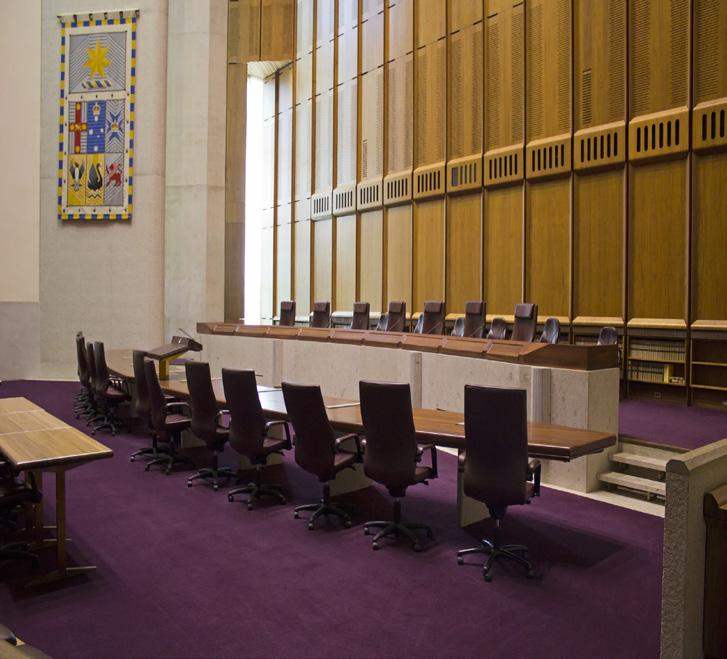

POSSIBILITIES GUIDE 2025




Vice President (Education) Welcome
We are proud to present the 2025 edition of the UNSW Law Society Possibilities Guide.
The Possibilities Guide seeks to be a starting point for students to gauge their interests and navigate the diverse possibilities open to UNSW Law students. As law students at a top-ranking university which facilitates an application-focused learning style in conjunction with practical industry experience, we are all uniquely positioned to thrive irrespective of what career path we find ourselves on. Whether it is in private law, public law and policy, pro-bono work, at the Bar or even in a non-legal sector, the list of possibilities is truly endless.
The number of career paths may seem intimidating, and it is difficult to start researching careers without any background knowledge on what is available to you after graduation. Through reading the professional testimonials and other pathway information within this Guide, we hope this allows you to maximise the opportunities available to truly work out where your passions lie.
Whether you are in first year or about to graduate, we hope that this Guide opens your eyes to new pathways and is useful on your journey ahead. We wish you all the best.
June Kim
UNSW Law Society Vice-President (Education)

PUBLIC INTEREST CAREERS
Introduction to Public Law

What is Public Law?
Public law governs the relationship between individuals and the state. It encompasses areas such as constitutional law, administrative law, and criminal law, and concerns the powers, responsibilities, and limits of government institutions. This field addresses questions of governmental power - how laws are made, how decisions are challenged, and how rights and freedoms are protected. Legal professionals working in public law may shape or interpret legislation, advise government departments on their powers and obligations, represent public bodies in courts and tribunals, or support policy development that affects entire populations. Most public sector legal work occurs in areas essential to the community, including health, education, justice, and infrastructure.
How do you get there?
Law graduates can pursue public law careers through the Australian Public Service (APS), the NSW Government Graduate Program, or by applying directly to individual agencies, departments, and regulators. Opportunities span across legislative drafting, administrative decision-making, litigation, and more.
For further information about the NSW Government Graduate Program, see https://iworkfor.nsw.gov. au/graduate-program.
For further information about the Commonwealth APS Graduate Programs, see https://content.apsjobs. gov.au/career-pathways/graduate-programs.
Crown and Government Solicitor

The Crown Solicitor’s Office provides legal services to the NSW Government and its agencies, rather than to private individuals. As the principal legal service provider to the state, the CSO advises on matters central to government operations and represents agencies in litigation. The CSO is structured into eleven specialist practice groups, covering areas such as constitutional and administrative law, criminal law, native title and Aboriginal land claims, commercial transactions, and public inquiries. The work is intellectually rigorous and often high-profile, offering law graduates early exposure to matters of public importance.
Find out more about paralegal, legal secretary and graduate programs here: https://cso.nsw.gov.au/careers/students-and-graduates.html.
Australian Government Solicitor:
While the Crown Solicitor’s Office provides to the NSW Government, the Australian Government Solicitor (AGS) provides legal services for Commonwealth agencies, offering advice and representation on matters of national significance. AGS is often involved in complex and high-profile cases with precedential implications for the Australian Government
Students can pursue graduate and internship opportunities with AGS directly or via the Australian Government Graduate Program (Legal Stream), which offers rotations across federal legal agencies.
Office
of the Director of Public Prosecutions

The ODPP (NSW) and CDPP are independent prosecuting authorities that play a vital role in the administration of criminal justice at the state and federal levels. The ODPP (NSW) prosecutes serious criminal matters on behalf of the state, including offences such as sexual assault, drug trafficking, and homicide. The CDPP, in contrast, handles offences against Commonwealth law, such as corporate crime, terrorism, and cybercrime, acting on referrals from federal agencies like the Australian Federal Police and Australian Securities & Investments Commission.


Both offices provide unique opportunities to work on high-stakes litigation and serve the public through impartial and principled prosecution. Law students and graduates interested in criminal law, public justice, and advocacy can explore clerkships, paralegal roles, and graduate positions.
Find out more about the ODPP’s opportunities here: https://www.odpp. nsw.gov.au/about-us/careers
Find out more about the CDPP’s graduate program here: https://www. cdpp.gov.au/careers
Criminal Defence

Criminal defence lawyers play a critical role in upholding the rule of law by ensuring that individuals accused of crimes receive fair representation and due process.
Working in defence offers the opportunity to advocate directly for clients, engage with complex factual and legal issues, and contribute to the protection of individual rights within the justice system.
Defence work can be pursued through private firms, Legal Aid Commissions, and community legal centres.

In NSW, Legal Aid NSW is a major employer of criminal defence solicitors, handling a broad range of matters from summary offences to serious indictable charges. Law students can gain experience through volunteer placements, internships, and graduate roles focused on advocacy, client engagement, and trial preparation.
Find out more about Legal Aid NSW opportunities here: https:// www.legalaid.nsw.gov.au/about-us/ careers

Government Agencies

Government agencies, both at Commonwealth-level and NSW-level, play a vital role in implementing policy, regulating key industries, and delivering services to the public. Many of these agencies have in-house legal teams that advise on legislation, draft policies, make administrative decisions, and represent the agency in tribunals or courts. Legal roles can range from highly specialised technical work to broad legal policy development and public interest advocacy.
employment registers where you can submit an expression of interest for future vacancies.
Search for a role in the Commonwealth APS here: https:// www.apsjobs.gov.au/s/
PRO BONO, COMMUNITY LEGAL
Search for a role in the NSW public service here: https://iworkfor.nsw. gov.au/
CENTRES & NGOs
Graduate pathways vary. Some agencies offer dedicated graduate programs, while others recruit junior legal officers directly. At the Commonwealth level, positions are typically classified using APS (Australian Public Service) levels — APS Levels 1–2 are generally considered entry-level roles (e.g. paralegals), while APS Level 3 and above are appropriate for graduates. Where specific roles are not advertised, many agencies maintain
Find out more about Commonwealth APS Graduate Program here: https://content. apsjobs.gov.au/career-pathways/ graduate-programs
Find out more about NSW Graduate Program here: https://iworkfor.nsw. gov.au/graduate-program

Community Legal Centres

Community legal centres (CLCs) are non-government organisations that provide free legal services to the community. They assist in making the law accessible and provide advice to eligible clients in a range of topic areas such as criminal law, civil law, tenancy and strata issues. The services offered include general advice, case work and representation but this will vary from centre to centre.
There are two different CLCs: generalist and specialist centres. Generalist centres provide legal services in a range of legal areas. They focus on servicing their own community with a specific catchment area. Specialist centres do not have a catchment area requirement but instead focus on one particular area of the law.
Volunteering at a CLC is a great way for not only to give back to the community but also a way to gain practical experience in the legal field. Depending which type and what CLC you decide to volunteer
at, your work will differ but generally you would be involved in preparing clients, arranging appointments, preparing legal briefs and other administrative tasks.
Find out more about volunteering at the Marrickville Legal Centre here: https://www. mlc.org.au/get-involved/clientintake-officers/
Find out more about volunteering at the Redfern Legal Centre here: https://rlc. org.au/work-and-volunteer
Find out more about volunteering at the Inner City Legal Centre here: https://iclc. org.au/volunteer/
Find out more about volunteering at the Aboriginal Legal Service here: https://www. alsnswact.org.au/volunteer
Non-Government Organisations

NGOs play a vital role in advancing causes such as human rights, environmental protection, social justice, and international development. Rather than specialising in narrow areas of law, their work is often issue-based and interdisciplinary. Legal roles within NGOs can involve research, strategic litigation, policy development, law reform advocacy, community legal education, and international diplomacy. Other roles may include lobbying, public campaigning, government submissions and journalism.
Getting involved often starts with volunteering, internships, or research assistant roles. Explore individual organisations’ websites for current opportunities and tailor your application to their mission and activities - demonstrating a genuine understanding of their work is key
Find out more about volunteering at the Refugee Advice & Casework Service here: https://www.racs.org. au/volunteer

Courts

The judiciary is the branch of government composed of courts in various jurisdictions. Graduate positions available in courts include as a judge’s associate/tipstaff. The nature of the role varies between individual judges, but generally, it involves providing personal and research assistance to a judge. Appointment is generally for one year.
There is no uniform application process for associateships or tipstaff positions. Generally, they are not advertised but involve sending a cover letter, CV and academic transcript directly to the judge. Most judges will appoint associates/ tipstaves some time in advance of commencement. It is recommended that applicants also research the
Find out more about judges associates, tipstaves and researchers in the NSW District Court here: https://districtcourt.nsw.gov.au/ about-us/careers.html
Find out more about judges associates, tipstaves and researchers in the NSW Supreme Court here: https://supremecourt.nsw.gov.au/ about-us/careers.html
Find out more about judges associates in the Federal Court of Australia here: https://www.fedcourt. gov.au/about/employment/associates

Public International Law

Public International Law governs the relationships between states, international organisations, and, in certain cases, individuals and non-state actors such as corporations. It sets the legal framework for how states interact in areas such as diplomacy, trade, human rights, armed conflict, and environmental protection. Areas of practice may include international humanitarian law, refugee and border protection law, treaty negotiation, jurisdiction over air and space, and international environmental law
There are several pathways into careers in public international law. In Australia, lawyers may work on international law matters through government departments such as the Department of Foreign Affairs and Trade, the Attorney-General’s Department, or the Department of Home Affairs. Internationally, opportunities exist with organisations such as the United Nations and its specialised agencies, the World Bank, the International Monetary Fund (IMF), the Organisation for Economic Cooperation and Development, the World Trade Organization, and inter-
national courts and tribunals.
Find out more about the Department of Foreign Affairs and Trade’s graduate program here: https://www. dfat.gov.au/careers/dfat-aps-careers/ graduate-program
Find out more about internships at the World Bank Group here: https:// www.worldbank.org/en/about/ careers/programs-and-internships/ Legal-Internship-Program
Find out more about opportunities at the United Nations Association of Australia here: https://www.unaa. org.au/about/career-opportunities-2/

PRIVATE LAW CAREERS
Introduction to Private Law

What is private law?
Private law governs the relationships between individuals, companies, and other private entities. It encompasses a wide range of practice areas, including contract law, property law, tort law, corporate law, intellectual property, trusts and estates, and family law. Lawyers working in private law often assist clients with resolving disputes, structuring commercial transactions, protecting their rights and assets, or advising on legal risks and compliance.
How do you get there?
Most law students begin their private law careers through paralegal roles or clerkships at commercial law firms, which can lead to graduate offers. Firms typically run clerkship programs in their penultimate or final year, where students work in different practice groups and gain exposure to client matters.

Banking and Finance

What is it?
Banking and finance focuses on the relationship between banks, financial institutions and other stakeholders. Lawyers in this field assist in structuring and overseeing complex transactions between two different parties. These may include loans, credit facilities, debt restructuring, project finance, and syndicated lending. This area of law plays a critical role in facilitating financial transactions and ensuring compliance with regulatory frameworks, both domestically and internationally. finance and foreign investment.
What do banking and finance lawyers do?
Work in this field is typically transactional and can involve:
• Drafting and negotiating finance agreements, security documents, and facility arrangements.
• Advising on regulatory compliance under financial services laws and banking
• Working on cross-border finance matters, including trade finance and foreign investment.
Banking and finance lawyers often work closely with other practice areas like corporate law, tax, and insolvency, making it a highly collaborative and commercially integrated field.
What individuals are best suited for banking and finance law?
This area suits individuals with strong analytical and problemsolving skills who enjoy complex, high-value transactions and thrive in a fast-paced commercial environment. Attention to detail, a good grasp of financial principles, and the ability to understand and advise on risk are essential. If you’re interested in global markets, corporate strategy, and high-stakes deals, banking and finance offers a dynamic and intellectually rewarding legal career. banks, financial institutions and other stakeholders.
Competition and Consumer Law

What is it?
Competition and consumer law governs the rights and responsibilities of businesses and consumers in the marketplace, largely shaped by the Competition and Consumer Act 2010 (Cth) and enforced by bodies such as the Australian Competition and Consumer Commission (ACCC). The law encompasses issues such as product safety and quality, misleading and deceptive conduct, anti-competitive practices, price fixing, and misuse of market power.
What do competition and consumer lawyers do?
Lawyers in this field may work in both the public sector, such as for the ACCC or other regulatory bodies, or in the private sector through law firms or in-house legal teams. Their work often involves representing consumers or businesses in disputes over breaches of consumer rights, advising companies on compliance with competition and consumer
protection laws, assisting clients during investigations or enforcement actions by regulators, and handling litigation related to unfair practices, anti-competitive conduct, or product liability.
What individuals are best suited for competition and consumer law is best suited for?
This field is ideal for those interested in both advocacy and advisory roles, and who want to work at the intersection of law, economics, and public policy. It suits individuals who enjoy regulatory work and are passionate about fairness and ethical business conduct.
“I enjoy the dynamic nature of competition and consumer law and how the landscape and priorities of the ACCC are constantly evolving. I would say try and do a summer clerkship rotation or paralegal in this area at a law firm you could see yourself working at in the future.”
– Solicitor I, King & Wood Mallesons
Employment Law

What is it?
Employment law is a branch of civil law that governs the relationship between employers and employees. It covers a wide range of workplace issues, including discrimination, harassment, unfair dismissal, workplace health and safety, and employee entitlements such as wages, leave, and termination rights.
What do employment lawyers do?
Lawyers in this field advise clients, whether employers, employees, unions, or government agencies,on their rights and responsibilities in the workplace. Their work may involve drafting and reviewing employment contracts and workplace policies, resolving disputes through negotiation or mediation, appearing before tribunals such as the Fair Work Commission, and litigating complex employment matters. They also advise on redundancy processes, enterprise bargaining, workplace investigations, and compliance with employment laws and industrial relations frameworks.
What individuals are best suited for employment law?
This area is ideal for those who are people-focused, empathetic, and interested in social justice or workplace fairness. It suits individuals who enjoy advocacy, negotiation, and advisory work, particularly in contexts where legal outcomes can have a significant impact on someone’s livelihood or wellbeing.
“What I most enjoy about my role is the opportunity to work closely with clients to resolve complex workplace issues, in particular providing support for clients to navigate sensitive workplace investigations. One piece of advice that I have to offer aspiring workplace lawyers is to develop strong communication and listening skills, because you can always learn the technicalities of the law but the ability to communicate effectively and listen will help you build deep client relationships to make you the go to person.”
– Associate (Workplace Relations) I HFW Australia
Family Law

What is it?
Family law focuses on legal issues that arise within domestic and familial relationships. It covers a wide range of matters including divorce, separation, child custody, parenting arrangements, child support, spousal maintenance, adoption, surrogacy, and paternity. The area is deeply personal and often emotionally charged, requiring a sensitive yet pragmatic approach.
What do family lawyers do?
Family lawyers assist clients in navigating the legal implications of family breakdowns and changes. They largely focus on resolving disputes outside of courts and through alternative dispute resolution processes like mediation. Their role also includes ensuring the best interests of any children involved are prioritised and protected. Family law practitioners can choose to maintain a broad
practice, advising on a variety of issues, or specialise in specific areas such as international child abduction, domestic violence, or complex financial settlements. The work often intersects with other areas of law, such as property, criminal, and migration law.
What individuals are best suited for family law?
This field is well-suited for individuals who possess empathy, resilience, and strong interpersonal skills. Family law often involves guiding clients through stressful and emotionally challenging situations, so clear communication, emotional intelligence, and problem-solving abilities are essential. If you’re passionate about helping people through significant life changes and advocating for the rights of vulnerable individuals—especially children—family law can offer a fulfilling and impactful career.
Intellectual Property Law

What is it?
Intellectual property (IP) law protects the legal rights individuals and organisations hold over intangible assets including written works, music, drawings, paintings, firms, inventions and the like. The purpose of IP law is to ensure that creators can attain ownership of their assets and control how it is used or reproduced. IP lawyers assist clients - which ranges from artists, inventors and multinational corporations - in securing and enforcing these rights. In terms of how to practise in this area of law, there are a range of public and private sector positions as pathways into IP law. Graduates can also work for government agencies who oversee the acknowledgement and acceptance of intellectual property.
What do intellectual property lawyers do?
Work in this field can be at law firms, in IP law departments, in-
house at different corporations or government agencies. Lawyers in this space can either specialise in a specific area of IP or be more general in their practice. In practice, IP lawyers assist in the filing of patents, copyrights, trade marks, as well as drafting licensing agreements. Their work can be transactional, such as advising on IP rights in commercial rights, or litigious, including pursuing or defending potential infringements.
What individuals are best suited for intellectual property law?
IP law is ideal for those with a creative mindset, a strong eye for detail, and an interest in innovation, the arts, or emerging technologies. It suits individuals who enjoy working at the intersection of law, commerce, and culture. A background or passion in science, media, design, music, or engineering can be particularly useful, especially for those considering patent law, where technical expertise is often required.
Litigation and Dispute Resolution

What is it?
Lawyers who work in commercial litigation will be involved in dispute resolution between two or more parties. The field operates under both state and federal jurisdictions and often involves complex legal and factual issues that require strategic dispute resolution. Commercial litigation opens up a wide range of opportunities, including representing corporate clients for civil litigation and responding against competition law investigations that are conducted by the ACCC, as well as highprofile international arbitration for infrastructure disputes.
What do litigation lawyers do?
Lawyers in this area assist clients in managing disputes through negotiation, mediation, arbitration, or court proceedings. Their work includes drafting letters of demand, preparing court documents, providing legal advice, and
advocating in various forums. They may act on behalf of corporate clients, government entities, or individuals, and be involved in matters ranging from civil litigation and regulatory compliance to international arbitration and class actions.
What individuals are best suited for litigation law?
This area of law role demands strong legal research, analytical thinking, and persuasive communication skills. This field suits individuals who are highly analytical, enjoy strategy and advocacy, and are comfortable working under pressure. It is ideal for those who thrive on solving complex problems, navigating legal arguments, and managing high-stakes matters with significant commercial implications.

Media Law

What it is: Media law is a dynamic and multifaceted area of legal practice that addresses issues arising across film, television, digital media, advertising, publishing, marketing, and influencer content. At its core, media law encompasses legal concerns related to content creation and distribution, including copyright, defamation, privacy, censorship, and intellectual property rights. With the rapid evolution of technology and communication platforms, the boundaries of this field are constantly shifting, making it one of the most diverse and intellectually stimulating areas of law.


What media lawyers do: Practically, media lawyers day-to-day work often involves drafting and reviewing contracts, conducting legal clearances for productions and advertising campaigns, and advising on rights acquisition, licensing, and distribution. Media lawyers may represent a wide range of clients - from production studios and publishing houses to individual creators, artists, and influencers. Their role can extend from providing preventative legal advice during pre-production to advocating in disputes, whether through negotiation, mediation, or litigation.
Media law is best suited for: A career in media law is ideal for law students interested in creativity, nnovation, and working at the intersection of culture and regulation, media law offers an exciting and ever-changing career path.
Medical Negligence

What it is: Medical negligence is a specialised area of tort law that deals with harm caused to patients due to the failure of healthcare professionals to provide an appropriate standard of care. It sits at the intersection of law, ethics, and medicine, often involving complex questions about duty, causation, and expert evidence.
What medical negligence lawyers do: Lawyers in this field represent either plaintiffs (patients) seeking compensation or defendants such as hospitals, doctors, or insurance providers. Their work involves analysing medical records, briefing expert witnesses, advising on liability, negotiating settlements, and appearing in court or tribunals. They must navigate legal tests for negligence, causation, and damages, often working on emotionally sensitive cases involving serious injury or loss of life.
Medical negligence is best suited for: Medical negligence law is best suited for students with strong attention to detail, empathy, and the ability to handle complex factual scenarios. It’s ideal for those who enjoy both litigation and research, and are interested in the healthcare system, medical ethics, or public interest work. A background or interest in health sciences can be an advantage.
Barrister | Frederick Jordan Chambers
“Medical negligence claims are very complex. For those involved in a claim, it can be allencompassing. It exists at the confluence of law, science and humanity. As a barrister in this area of practice you are commonly working at the very edge of scientific knowledge and legal reasoning. You need to be able to absorb a great deal of information of variable readability in short timeframes. You also need to be able to see the medical detail of a matter (the facts) and, at the same time, hone in on the essence of the claim (the law). But, above all, you need to remember that you are dealing with human beings, who have been hurt, whose professional reputations are at stake, and who need assistance to resolve the claim. Providing that assistance is both a privilege and immensely satisfying. Learning how to do so takes time and effort, and is greatly enhanced by long-term relationships with senior practitioners.”
Mergers and Acquisitions Law

What it is: As businesses grow, , so too does the need for consolidation of companies or company assets through the financial transactions including mergers, acquisitions, consolidations, tender offers, purchase of assets and management acquisitions of these businesses. Merger and Acquisitions (M&A) law involves the legal processes that enable companies to join forces, acquire one another, or restructure their assets.
What they do: M&A lawyers play an essential role in advising clients throughout the various stages of two companies joining forces to become a single entity or one company obtaining a majority stake in another firm. These lawyers also negotiate the terms of the agreement, ensuring that both parties are in alignment, and drafting the necessary documentation to effect the sale or merger. The role requires close collaboration with business and financial advisors to ensure that the transaction is legally sound, efficiently executed, and in the best interest of the client.
M&A is best suited for: M&A law is best suited for individuals who excel in high-pressure environments and enjoy working on complex, multifaceted transactions. This area of law requires individuals who possess great attention to detail, excellent negotiation skills and the ability to draft clear and precise legal documents. Ideal candidates for this area of law should have a strong understanding of business operations, financial analysis and commercial strategy.
Solicitor I King & Wood Mallesons
I am a cross-border M&A lawyer at King & Wood Mallesons and currently studying the BCL at Oxford University. As an M&A lawyer, I enjoy the camaraderie of working in a close-knit team on some of Australia’s largest and most complex transactions. My piece of advice is to read the AFR to keep abreast of market trends to develop your commercial awareness.
Solicitor I King & Wood Mallesons
I enjoy working on fast paced transactions as part of a high performing team. My advice for aspiring M&A lawyers is to develop resilience and ways to push through and reset your mental state when things get tough - it can be a very challenging area at times.
Real Estate and Property Law

What it is: Real estate and property law, often referred to as ‘real property law,’ focuses on assisting clients in managing their rights and responsibilities concerning property. This includes both commercial and residential real estate, covering a wide range of legal issues such as acquisitions, disposals, leasing, developments, and estate management. Real estate lawyers also handle disputes related to property, which can lead to litigation when conflicts arise. In residential real estate, the focus is often on conveyancing - the legal process of transferring property from one owner to another. Commercial property law, on the other hand, involves more complex transactions, including advising on the sale, lease, or development of properties.
What property lawyers do: Real estate lawyers provide a variety of services depending on the nature of the property transaction. For commercial property, they may advise clients on acquisitions, leasing agreements, and the development of real estate projects. They also handle the legal aspects of property financing, managing estate portfolios, and navigating regulatory requirements. In residential real estate, real estate lawyers assist in the conveyancing process, ensuring that all legal requirements for property transfer are met. Typical clients include property developers, institutional investors, real estate funds, corporations, and financial institutions, all of whom require sound legal advice to manage their property interests.
Property law is best suited for: Property Law is best suited for: Real estate law is ideal for individuals who enjoy working on large-scale, often complex transactions and have a strong interest in the property sector. Ideal candidates for this field should have good negotiation skills, an understanding of commercial and residential property law, and the ability to handle highpressure situations. If you are drawn to a dynamic, fast-paced field that combines legal expertise with practical business considerations, real estate law offers a rewarding career path.
Harrison Zheng | UNSW Law & Justice Alumni
I am working as a Law Clerk (Paralegal) in the Private Equity Real Estate team at King & Wood Mallesons. Having predominantly worked in litigation teams prior, I didn’t know what to expect when I joined the transactional practice. Within the first couple of weeks, I immediately fell in love with the fast-paced and complex work that I came across.
What really surprised me was the diversity in the work that I was doing and the skills that I was learning on the job. When most people hear Real Estate, they usually only think of the purchase and sale of property. However, there’s so many things outside of the contract sale that lawyers are involved in: from creating the debt arrangements to have enough money to purchase the property or to purchasing a company and business that is attached to land.
Taxation Law


What it is: Taxation law primarily involves assisting clients in navigating complex tax codes and minimising potential tax risks. Within Australia, there are numerous forms of taxation including income tax, capital gains tax, custom duties, and inheritance tax as a few. Tax lawyers play a crucial role in helping both individuals and businesses comply with their legal obligations while structuring their transactions in a tax effective way.
What tax lawyers do: Tax lawyers provide legal advice on the tax consequences of transactions, business structures, investments, and corporate operations. They interpret legislation, advise on tax implications of commercial deals, and engage in tax litigation following an internal review by government authorities. Many tax lawyers work closely with accountants, financial advisors, and in-house counsel to deliver holistic advice.
Taxation law is best suited for: Tax law is ideal for those who enjoy problem solving, attention to detail, and working with logic-based systems. It suits individuals who are analytical, and comfortable working with technical language and complex legislation. A strong interest in finance, economics, or commercial law can be beneficial.
Wills and Estate

What it is: Wills and estates law is a highly specialised area of civil law that focuses on the planning, distribution, and management of an individual’s assets after death. This area also covers the administration of trusts, powers of attorney, and guardianship appointments.
What Wills and Estate Lawyers do: Lawyers in this field assist clients in drafting wills and setting up trusts, ensuring that an individual’s wishes are clearly documented and legally binding. They also provide guidance on delegating powers of attorney, appointing guardians for minor children, and advising on other estate planning matters. In addition to drafting legal documents, lawyers may assist clients in auditing their assets to ensure proper distribution according to their wishes.This role can be particularly sensitive, as it often involves working with families during emotionally charged times.
Wills and Estates is best suited for: Wills and estates law is ideal for individuals who have a strong attention to detail, empathy, and an ability to manage complex legal documents. The work often requires a good understanding of both legal principles and family dynamics, making it suitable for those who can balance technical legal work with interpersonal communication.

In-house Counsel

Working as part of in-house counsel differs from private practice as it is only one client you will be working for. As part of the in-house legal team you will need to meet the particular demands of only one employer. As many businesses seek to avoid costs associated with employing external legal services, in-house practice has been a growing industry and graduates have an increased opportunity to enter into this sector. Various mainstream companies have their own in-house team that provides a platform to work to utilise legal skills and expertise.
Many companies run their own clerkship or vacation programs for penultimate and graduating students. Lawyers who begin their careers at a commercial law firm can also move into an in-house role as the skills that are gained are easily transferable.
The below table captures the differences in working in-house compared to a law firm.


EMERGING AREAS OF LAW
Cybersecurity Law

What it is:
Cybersecurity law addresses legal issues arising from the increasing reliance on digital technologies and the internet. It deals with protecting information systems, responding to cyber threats, and advising on legal frameworks governing data breaches, cybercrime, and digital privacy.
What Cybersecurity lawyers do:
Lawyers in this field advise clients— often governments, corporations, or tech firms - on compliance with cybersecurity legislation, data protection, and incident response protocols. They may work on cases involving identity theft,
ransomware attacks, cross-border data transfer, and collaboration with law enforcement in responding to international cybercrime.
Cybersecurity law is best suited for:
Cybersecurity law is ideal for those with a strong interest in technology, digital privacy, and global legal frameworks. It suits analytical thinkers who enjoy working in a fast-changing area of law and who are comfortable navigating legal grey areas. A background or interest in IT or computer science can be an advantage. law enforcement in responding to international cybercrime.

Legal Technology
What it is:
Legal technology refers to the use of software and digital tools to streamline legal services, manage documents and data, and support legal decision-making. It is transforming how legal work is delivered across law firms, courts, and in-house teams.
What is involved in Legal Technology:
Professionals in legal technology roles may develop or work with platforms that automate document review, manage case workflows, conduct legal research using AI, or
improve access to justice through online dispute resolution. These roles may exist within law firms, legal start-ups, or legal operations teams in large companies.
Legal technology is best suited for: Legal technology is well suited to students interested in innovation, entrepreneurship, or improving legal systems through technology. It’s ideal for problem-solvers who are comfortable with digital tools, systems thinking, and interdisciplinary collaboration - particularly between law and computer science or business.
PATHWAYS
Admission to the Legal Profession
STEP 1: Attain an LLB or JD
The first step to attaining an admission to the legal profession is to complete a Bachelor of Laws (LLB), Juris Doctor (JD) or equivalent degree.
The price of attaining an LLB or JD can vary depending on the institution you attend, the type of fee-paying student you are and possibly the type of degree you choose to pair with it.
Duration: At UNSW, an LLB can only be completed in a double degree combination. A combined Law degree (LLB) at UNSW is around 5 years, a Juris Doctorate takes 3 years.
Cost: For a CSP-fee paying student, the expected fees for the first year of a Commerce/Law degree is $16,992.
STEP 2: Complete a Practical Legal Training program
You must complete a Practical Legal Training (PLT) course from an accredited provider. UNSW offers Practical Legal Training separate from their LLB and JD courses.
Successful completion of a PLT program leads to the award of a Graduate Diploma of Legal Practice.
Duration: The training takes approximately four-five months full-time. Workplace experience requires around 40 working days of supervised experience in the delivery of legal services.
Cost: The cost of PLT training can vary depending on the institution you attend. At UNSW, the price of the Standard PLT program is approximately $11,100.
For further information, see: https://www.unsw.edu.au/content/ dam/pdfs/future-students/2025-12PLT-Brochure.pdf
Admission to the Legal Profession
STEP 3: Admission to the Supreme Court of New South Wales
The Supreme Court of New South Wales may admit a person to the Australian legal profession as an Australian lawyer if the person:
• Is aged 18 years or over; and
• Is not already admitted to the Australian legal profession; and
• has attained the specified academic qualifications prerequisite, and
• has satisfactorily completed the specified practical legal training prerequisite, and
• Is a fit and proper person to be admitted to the Australian legal profession, and
• Takes an oath of office, or makes an affirmation of office, in the form required by the Supreme Court.
STEP 4: Obtain a Practising Certificate
To practise as a solicitor in NSW, you must hold either an Australian practising certificate issued by the Law Society’s Council or a practising certificate issued by the designated regulatory authority in another Australian jurisdiction.
Cost: The cost of a practising certificate can range from $440.00 to $980.00 depending on the type of legal employment that you pursue.
The most current information available about admission can be found here: https://www.lpab.justice.nsw.gov.au/ Pages/admission-lawyer/guide-forapplicants-admission.aspx.
The Bar
Barristers specialise in advocacy work in courts and tribunals and provide legal advice. They are separate from solicitors and generally work in the upper levels of the Australian court hierarchy and tribunals. The role generally involves preparing and assisting clients with their court appearances as well as representing them.
In order to practice as a barrister in New South Wales, you must be admitted as a lawyer, sit and pass the Bar exam, and complete a reading program. Barristers are sole practitioners, but commonly work in chambers comprising barristers with a range of experience. For students interested in a career as a barrister, experience as research assistant at a barrister’s chambers is a good opportunity to gain insight into the type of work that barristers do.
Barrister I Black Chambers
“I love the opportunity for creativity in advocacy; the chance to work collaboratively with others in a legal team; and the opportunity to use the tools of the law for the protection and advancement of human rights. Advice: You need to constantly hone your instinct for injustice and act on it fearlessly when you detect it.”
Finding your First Legal Job
Where to look?
UNSW Law Jobs Board
Did you know that UNSW Law has an exclusive student portal? On “myLaw” you can find numerous resources that will help you secure your first legal job such as CV and cover letter assistance. Most importantly, you’ll also be able to find the UNSW Law Jobs Boards which is an invaluable resource for finding your first job. Many firms will post here first or even in lieu of other general job listing sites.
Job Sites
Indeed, Seek, Jora etc. are all useful sites to start your search and get an idea of the scope of the roles that you will be seeking out.
UNSW
Law Discussion Page on Facebook
Joining the UNSW Law Discussion Page on Facebook can yield you more than advertisements for all the awesome LawSoc events. Law
students will occasionally post job openings for roles that they may be moving on from or have heard about from other sources. This is a highly underrated source of job listings as many of these jobs will not be listed elsewhere!
Join here: https://www.facebook.com/groups/ unswlawsociety/
Types of Jobs
Paralegal
Smaller firms often have opportunities to take paralegals on an ad-hoc basis. These firms look to hire law students and provide them with experience within their respective area of practice. This is a good opportunity for students to gain an understanding of the inner workings of a law firm, and find out what interests them and which don’t. Paralegal roles will often involve legal research so make sure you pay attention in those LRW tutorials!
Clerkship
Legal clerkships are a structured program that provides penultimate year law students with an opportunity to gain work experience within commercial law firms. They are typically summer programs. However, some firms will offer different seasonal placements instead.
While not the only pathway, clerkships are a potential stepping stone towards working in a large commercial law firm. Often those who clerk over the summer are offered graduate roles at the end of the program.
Clerkships offer students the opportunity to gain experience in a commercial environment and apply their skills to multiple areas of private law practice. Clerks often rotate between two to three practice areas within the firm.
Graduate Roles
Complete a Bachelor of Law (LLB) or a Juris Doctor (JD) degree.
Whether you are offered a law graduate from a law graduate position from your clerkship or through application. Both public and private practice have graduate degrees open up. Often the work done in both private and public practice as a graduate is similar. Your first year in a graduate position is often completed in conjunction with your PLT.
Solicitor I King & Wood Mallesons
“What I enjoy the most - the diversity of work I am involved in and the people I work with. One piece of advice - It is great to aspire to enter into one particular area of law but be open to other experiences. You might find yourself enjoying an area of law that you never realised you would have been interested in.”

The Clerkship Process
What is a clerkship?
A clerkship is a summer program for penultimate or final-year law students hosted by a law firm. The majority of major law firms in Australia offer clerkships and they are a fantastic opportunity to get a taste of what practising as a lawyer in private law is like. Clerkships mostly range from 4-15 weeks where you rotate between 2-3 practice areas of the firm.
Key Dates for the 2025 Clerkship Process:
Wednesday, 11 June – Applications for summer clerkships open at 9:00am. Sunday, 6 and Sunday, 13 July – Applications for summer clerkships close at 11:59pm.
Wednesday, 10 September – Offers for summer clerkships can be made from 9:00am.
Thursday, 11 September – Offers for summer clerkships must be accepted or declined by 1:00pm.
Participating firms include:
• Allens
• Ashurst
• Baker McKenzie
• Clayton Utz
• Clifford Chance
• Corrs Chambers Westgarth
• DLA Piper
• Gadens
• Gilbert + Tobin
• Herbert Smith Freehills
• Minter Ellison
Smaller boutique firms also offer their own internships which operate on their own calendars.
How can you prepare?
The UNSW Law Society Private Law Careers portfolio is dedicated to helping UNSW students interact with the field of private law. This portfolio hosts many events that students should get involved with to learn more about opportunities in private law, connect with industry professionals, and get their foot in the door. Get advice from firms on Clerkship Cocktails Evening on 5 June 2025 - more information available here: https://www. facebook.com/events/1237506091715959?active_tab=about
What happens after a clerkship?
You may receive a graduate offer after the summer ends and many students who are successful in securing a summer clerkship are offered paralegal positions after the program at the firm.
Of course, the clerkship is only one way to break into the private law field. For further information about 2025 clerkship process, visit: https:// www.lawsociety.com.au/Legal-Communities/Law-Students/ClerkshipRecruitment-Program

Acknowledgements

Vice Presidents
June Gyung Kim (Education)
Teodulfo Jose O. Reyes (Publications)
Student Development Directors
Naz Hashemi Pour
Sarveshcika Yuvaraj
Publications Directors
Aaryan Pahwa
Ashna Aravinthan
Publications Team
Ambeikaa Mishra
Balraj Mander
Inika Narayan
Melina Le
Shayan Bidiwale
Siddharth Ramachandran

